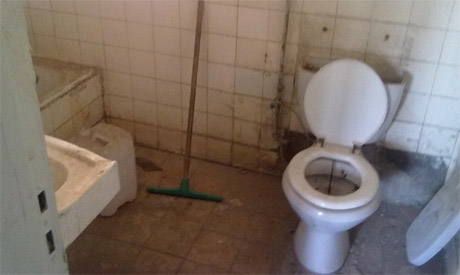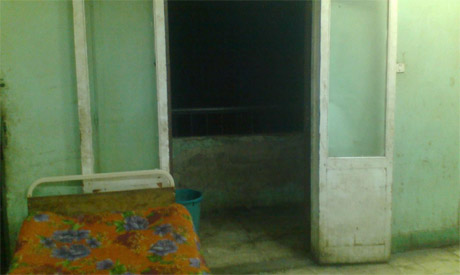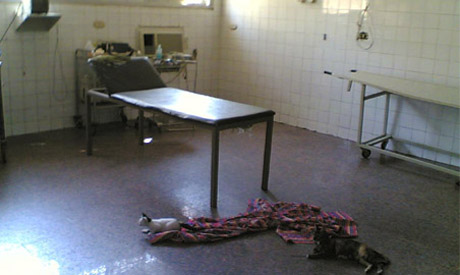The building looked like it had been abandoned for decades. It was an island in a huge pile of rubbish. Grey paint was peeling off its walls and a sewage drain had erupted near the entrance filling the air with an abominable stench.
The only indication of what the structure was used for was a tattered sign reading "Kidney Dialysis Centre."
The destitute building is in fact a part of the Helwan General Hospital, in Upper Egypt.
The horror continued inside: the stone stairs are broken, dirt blackens green walls, the bathroom is filled with broken chairs and more rubbish, and puddles fill the corridors leading to the wards.
"From the moment you enter the grounds of the hospital, you feel shocked and depressed," says Nurse Sayeda El-Sayed, who does not work at the hospital but is a syndicate activist. "Imagine what patients feel like when they see all this mess."
El-Sayed is here on a mission: she wants to talk to the nurses about planning a possible strike similar to the doctors' strike, which began on 1 October.
"The situation for the nurses is terrible in this country," says ElSayed. "They pay us nothing for our work. If you are working with no pay, then you are a slave."
Indeed, the nurses in the Helwan Public Hospital earn a mere 90 piastres (15 cents) for an entire twelve-hour shift. It is not much better in other hospitals. In several Cairo hospitals, nurses earn only LE1.25 for an entire night’s shift.
"Usually it adds up to LE70 ($11) for an entire month’s work," says El-Sayed. "How can anyone live on that?"
El-Sayed’s complaints echo that of doctors who have been calling for better working conditions for years.
They have held three strikes since the January 25 Revolution began. The latest ongoing strike is demanding a 15 per cent rise in the proportion of the state budget spent on health, better healthcare standards, improved security at hospitals and wage increases.
"The whole healthcare system is falling apart," complains Nurse El-Sayed. "Look at how dirty this hospital is. It’s one of the worst I’ve seen."
In the line of fire
"No available space" are the three words that meant ER physician Mohamed Rabie has been attacked four times.
Rabie works in the Mansoura International Hospital, in the Nile Delta, which receives patients from four governorates.
Other hospitals in the region often lack the equipment and means to treat the cases they receive and so transfer them to this hospital.
However, Mansoura International is barely coping. It has only 12 beds in the general Intensive Care Unit (ICU) and eight in the cardiac ICU. Only three beds are available in the children’s ICU.
The shortage results in loss of life. During one shift, Rabie lost three children because they desperately needed to be in the ICU and all three beds were taken.
"When these things happen, people think you are the one who is responsible and they attack you," says Rabie. "To the patient you become a representation of this corrupt system."
Dr. Hossam Kamel, an ICU physician at a village hospital in Mansoura says that he often has to transfer patients in critical condition to other hospitals because of lack of space in the ICU.
"These patients are barely hanging on to life and I would say that at least half of them die as they are being transferred," says Kamel. "Those who don’t die end up with have serious complications because of the delay."

Filthy bathroom at public hospital in Egypt (Photo: courtesy of the hospital's doctors)
Hospitals do not lack space but basic equipment is sparse too.
Dr. Khaled Abdel-Rahman, the coordinator of the doctor’s strike in Nile Delta governorate Dakahliya, says that he often has to bring his own thermometer and blood pressure units to work because there are not any available in the hospital.
"You have no other choice but to get your own equipment," he says.
The further away from the city the worse the situation gets.
In the tiny Manshiet El-Badry village in Mansoura, five young doctors work in a small medical clinic, which is the only medical facility in the village.
The clinic lies in front of a barn owned by a family living nearby. Donkeys, sheep and ducks graze at the doorstep of the clinic and the smell of manure wafts inside the waiting room.
The clinic has a broken dentist chair, an oxygen pump and a medical bag consisting of only four instruments. The clinic is also short on medicine.
"If a patient needs 30 blood pressure pills, I give him 20, because that is all I have," say Ahmed Bahgat, a resident doctor in the clinic.
The village people are poor, and buying basic medicine is sometimes more than they can afford. This is a scenario that is repeated in hospitals and clinics across Egypt.
"The patients here pay for almost everything even though they are supposed to get these services for free," says Dr. Ibrahim El-Zayat, a physician at Mansoura International.
Even if the medicine is available it is usually of little use because it is expired. The Ministry of Health also chooses to deal with pharmaceutical companies which make bad quality products with very low active ingredients, Abdel Rahman adds.
"So, the doctor has to double the dose in order for the medicine to have an effect," he says, "In Egypt, doctors create a medical system that doesn’t exist anywhere else in the world."

Patient room at a public hospital in Egypt (Photo: courtesy of the hospital's doctors)
Patient-doctor faceoff
These shortages often mean the doctors have to face the wrath of patients.
Dr. Mohamed Allam, a vascular surgeon, says that hospitals, which are supposed to be free, often charge patients for treatment. In one hospital he worked in, the manager decided to charge patients LE27 ($5) in order to create a case file for them and a LE2,000 ($328) down payment in order to be given a bed in the ICU.
"The managers used to give these orders and expect us to tell the patients," says Allam. "So we young doctors become the human shields of this failed medical system. That’s why you will find that it is the younger doctors who have to deal directly with the patients that are the ones who are really passionate about the strike."
Until the demands are met, the doctors have to deal with angry and distressed patients, and attacks on doctors have increased.
In the Mansoura hospital one doctor was beaten and had his phone stolen. Another doctor was hit in the face and needed 20 stitches. In Ismailia, a doctor was knifed in his side, resulting in chronic kidney problems.
The lack of security in the hospitals also means that thugs bring altercations into the hospital.
After a fight between two rival families in the Nile Delta industrial governorate of Mahallah, one of the family members who was badly injured was quickly pushed into the operating room for emergency surgery.
However, after the anesthetist drugged him, a member of the rival family stormed in and forced the doctor to wake him up so that they could kill him.
In another incident in the Upper Egyptian governorate of Minya, a man broke into an operating room and stole the kidney of the patient.
"I think this is a one of a kind incident. It has probably never happened anywhere else in the world," fumed Dr. Hossam Kamel, an Ear Nose and Throat (ENT) specialist and syndicate activist. "Doctors working the emergency room don’t know if they will still be alive at the end of their shift or not."
A big price to pay
Egyptian doctors often work in these difficult conditions for little to no pay. Young doctors are often given as little as LE185 ($30) basic salary for an entire month’s pay. When the incentives are added, usually the total salary is a meager LE900 ($148).
When doctors graduate from medical school, they usually have to complete a residency for two to three years, often far away from home, where they are expected to use the money to cover their living expenses and transportation.
Abdel-Rahman adds that doctors are often paid as low as LE4.5 (70 cents) an hour during a shift. This, he says, is a result of the unfair allocation of the current health budget, which is LE27 billion ($4.4billion).
"About LE13 billion ($2.1billion) of this is paid to employees in the headquarters of the Ministry of Health. One office, which only has three employees, gets LE1 million per month ($164,190)," explains Abdel Rahman, "doctors on the other hand are starving."
Indeed, in 2010, the head of the Medical Syndicate in Dakhalia, Abdel-Moneim Eid said that 40 per cent of doctors live under the poverty line.
The low income often forces doctors to seek work in private institutions alongside their work in public hospitals. However, balancing two jobs is not easy and doctors begin to make mistakes.
Dr. Allam says that in one public hospital he worked in, the top surgeon asked the younger physicians to perform 15 operations before 2pm.
"This of course affects the quality of the surgery. It also means that the surgery must be conducted quickly and that young doctors hoping to learn something will not get the chance," he says.
It also affects hygiene, a major problem in Egypt.
"Do you think we have 15 surgery packets for each surgery? No," says Allam, "We have four or five, which need to be properly washed and then sterilised in an incubator for at least twenty minutes. But this doesn’t happen."
This oversight is the reason why many patients face medical complications and why Egypt has the highest rates of Hepatitis C in the world.
Now that millions of Egyptians live with the virus, doctors dealing with patients end up getting infected too.
"Many Egyptian doctors die young because they start showing symptoms of liver failure from the virus but don’t earn enough to get proper treatment," Abdel-Rahman says.
"In fact, we only get LE19 ($3) as a compensation for the risk of infection."

Examination room at public hospital in Egypt(Photo: courtesy of the hospital's doctors)
No escape
For decades, Egyptian doctors, disillusioned with the working conditions in Egypt have sought work overseas, especially in rich Gulf countries.
In fact, according to Dr. Amr El-Shoury, official spokesperson for the doctors' strike, more than 60 per cent of Egyptian doctors work outside of the country.
However, even those who leave face obstacles. In Gulf countries, doctors are paid an equivalent to what they earn in their homeland. Egyptian doctors get paid far less than their colleagues from other countries.
"When you go to the embassy of a Gulf country, the first question they ask you is how much do you earn?" says Abdel-Rahman. "So an Egyptian doctor would get about 4,000 Riyals ($1,067), whereas Syrian, Jordanian and Yemeni doctors would earn 10,000 Riyals ($2,667). The Egyptian doctors are the cheapest and that is why I believe Gulf countries are also fighting this strike. They want us to remain cheap."
A better future?
As the doctors' strike enters the second month, poor Egyptians unable to afford treatment in private hospitals continue to suffer through Egypt’s public health system.
In the Mansoura University Hospital, the ground-level clinics are so full, patients are forced to wait on the pavement outside amid the rubble and rubbish.
In front of the bone clinic, injured patients lie on steel gurneys waiting for their turn.
Sabry Fikry stands next to his 10-year-old son Taha, who was run over by a tractor a month ago. Taha lies on a gurney, with his left leg swollen to twice its normal size. The bandage has fallen off the open wound in his thigh and flies are buzzing over the raw flesh.
His father finds a small bandage and lays it on the wound in an attempt to protect his son.
Fikry is from the coastal town of Port Said but he could not find treatment for his son there and was asked to come to Mansoura. For the past month, he has been transporting his son to the hospital for treatment.
"But I think that the Egyptian health system is great," says Fikry as he swatted a fly trying to land on his son’s wounds.
"Our system is clean, hygienic and the service is really good."
The irony of this statement does not shock physician Kamel.
"The problem is that the Egyptian people don’t know any better," he says sadly. "They don’t know that what is being done to them is a crime. They don’t know that it could be so much better."
Short link: